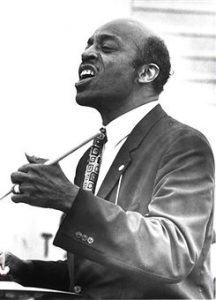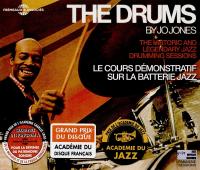JONESING FOR JO JONES
Jo Jones (1911-1985) is one of the most important percussionists in jazz history. In 1934, he joined Count Basie’s band, influencing the Great Buddy Rich and the Great Louie Bellson. He was a backbone for Basie’s traveling troupe up through 1948. He influenced swing and bop drummers by shifting the timekeeping role of the drums from the bass drum to the hi-hat cymbal. He recorded in the 1950s with Billie Holiday, Teddy Wilson, Lester Young, Art Tatum, Duke Ellington and more. Jones transcended technique and made pure music. He wasted absolutely no movements — everything he did looked effortless, and every move was perfectly executed. He was a paragon of efficiency and technique, utilizing amazing crossovers, an uncanny accuracy around the toms, and other assorted tricks — all the while maintaining a joyous, infectious smile while he played.
 We tend to think of jazz drummers simply as guys who are fast with a set of sticks or brushes and good at keeping time. But like all great jazz musicians, the best drummers know the instrument’s long history and the styles of all those who came before them. This was especially true of “Papa” Jones, who pioneered new ways of the drums while in Basie’s outfit (Jones took on the honorific “Papa” in later years to differentiate himself from drummer Philly Joe Jones).
We tend to think of jazz drummers simply as guys who are fast with a set of sticks or brushes and good at keeping time. But like all great jazz musicians, the best drummers know the instrument’s long history and the styles of all those who came before them. This was especially true of “Papa” Jones, who pioneered new ways of the drums while in Basie’s outfit (Jones took on the honorific “Papa” in later years to differentiate himself from drummer Philly Joe Jones).
In 1973, Jones recorded a highly unusual album that has gone unnoticed by many jazz fans, but not because it isn’t astoundingly original — it just hasn’t been easy to find. Titled The Drums, the album — which was released as two separate vinyl records in 1974 — was recorded in Paris by Hugues Panassié, a French jazz producer and critic who founded the Hot Club de France. What makes this album so unusual is that there is no music. Jones just talks about the evolution of jazz drumming and illustrates different drummers’ styles. So the listener gets to hear what Jo Jones’ speaking voice sounds like at length as well as illustrated samples of Jones playing in the styles of significant drummers.
For years, The Drums has been available only as a very expensive import, or perhaps as a digital download for one of the albums. Now, the historic and legendary jazz drumming sessions have been released in a digitized, restored, and reassembled deluxe 2-CD edition, complete with booklet and photographs. CD One is devoted to the drumming technique, and CD Two focuses on the great historical drummers from the world of classic jazz.
These albums were originally offered practically as jazz training material, but now stand sturdily on their own as a solo drum session. Jones is already a well-known force in the jazz world, but hearing him like this shows off even more of his talents as he works through many rhythms and changes while performing tributes to some of his favorite jazz drummers. Most numbers feature spoken introductions by Jones (written in French and English in the liner notes), and the whole thing almost feels like some intimate session – but the strength of his performance is tremendous, and the lack of other instruments really lets you hear that amazing way that Jo had of working all over the space of the drum kit.
A very literate, articulate individual, Jones had a well-earned reputation for outspokenness and volatility, especially in regard to musicians whom he believed had been elevated without sufficient artistic merit. But on these albums, he sounds positively avuncular. On the second CD, he speaks of other drummers with admiration, recreating their sounds: Baby Dodds’ shimmy; Alvin Burroughs’ use of a hidden quarter between his thumb and forefinger; Gene Krupa’s “one solid continuous beat” used in Goodman’s iconic “Sing, Sing, Sing”; Sid Catlett’s use of mallets; et al. He also gives credit to dancers as an influence, including Bill “Bojangles” Robinson (here, Jones tells us he will try and replicate what he played for “Bojangles” at Carnegie Hall, “and since I knew he had his pistol, I tried to do my best”). It’s an indispensable education on both musicianship and jazz history. (And who was “the world’s greatest drummer” according to Jones? Billy Gladstone.)
The Drums was originally released on Jazz Odyssey Records, the catalog of which was taken over in 2005 by the producer of this re-release, Laurent Verdeaux. And since Jones was on tour with Milt Buckner at the time of the recording, there is a bonus track of the duo’s 1969 recording of “Caravan” taken from L’Aventure du jazz, a French documentation of jazz greats filmed in New York and France from 1969-1972 by Hugues Panassié’s son, Louis, and his daughter-in-law (see clips of “Caravan,” above, and “I Found a New Chapeau” with Jimmy Slyde and George Benson in 1972, below).
This is a must for jazz aficionados, as it gives insight into Jones’s style and personality. Jones learned much by observing others from the classic big bang years of American jazz, and combined what he saw with a natural aptitude that seems unparalleled. This set will certainly inspire drummers to be better drummers, but more importantly, this is an amazing legacy — instructional or otherwise.
Jo Jones: The Drums
Fremeaux and Associates
CD One: 13 tracks | 56:08
CD Two: 23 tracks | 54:24
released October 13, 2017
available at Fremeaux and Amazon
![Post image for CD Review: THE DRUMS [Remastered] (Jo Jones)](https://stageandcinema.com/wp-content/uploads/2018/04/jo-jones-the-drums.jpg)

